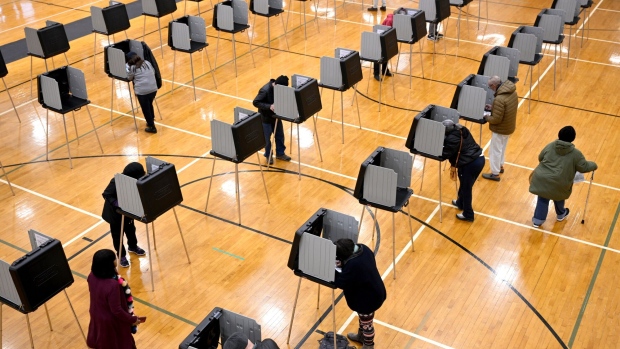Apr 9, 2024
Meta Leaders Say They’re Not Seeing AI Election Disinformation
, Bloomberg News

(Bloomberg) -- Meta Platforms Inc. is under immense pressure to ensure that social media content created by artificial intelligence doesn’t cause havoc with elections this year. The company’s top leaders say they haven’t seen that happen yet on their services.
“So far, it’s been very striking how little these tools have been used on a systemic basis to try to subvert or disrupt these elections,” Nick Clegg, Meta’s president of global affairs, said at an event on the company’s AI strategy in London on Tuesday.
There’s still time for that to change. The rapid spread of AI tools capable of generating realistic images, videos or audio clips coincides with a key global election year, with about half the world’s population headed to the polls in 2024. Experts fear that AI-generated content could mislead voters or seed disinformation on social media, citing incidents like fake audio of US President Joe Biden circulating to 20,000 voters in New Hampshire in January.
Last week, Meta announced plans to label all AI-generated content on Facebook and its other properties – even if that material isn’t generated using Meta’s own AI tools. Clegg said he was “quietly optimistic” about the technology sector agreeing on standards for moderating AI-generated media. “We should be vigilant,” he added. “But I would urge us to think of AI as a great tool to navigate this.”
Read More: AI Is Making Politics Easier, Cheaper and a Lot More Dangerous
On Tuesday, Clegg and other senior executives touted the company’s range of AI models, incorporated into products from Instagram to augmented Ray-Ban glasses. Meta has been a steadfast proponent of open-source AI. Releasing such technology freely, Clegg said, ensures that AI is not just kept “in the clammy hands of a small number of well-heeled companies in California.”
A new version of Meta’s flagship model, Llama, will arrive “within the next month, hopefully less,” Clegg added. The executives also stressed Meta’s potential to weave AI chatbots into more products. “In the near future, every single one of our interactions will be mediated through an AI assistant,” Yann LeCun, Meta’s chief scientist, said on stage while donning the company’s Ray-Bans.
Meta’s labeling policy would extend to these features, according to Chris Cox, its chief product officer. Any texts with chatbots on WhatsApp would be clearly labeled as conversations with AI, he said.
But Cox added that AI-generated media was “still de minimis” on the feeds of Facebook and Instagram.
©2024 Bloomberg L.P.





